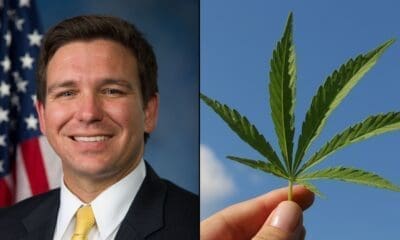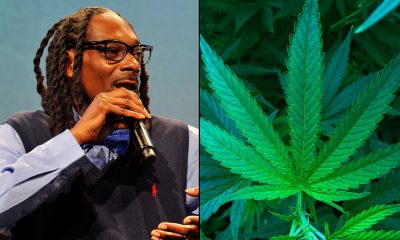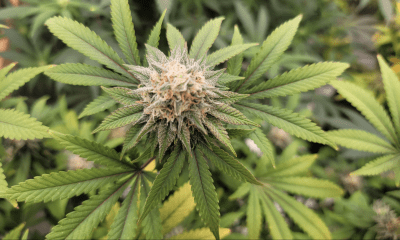Politics
New Sessions Memo: Does It Impact Marijuana?

Cannabis industry insiders are wondering how a new memo issued late last week by U.S. Attorney General Jeff Sessions could impact marijuana enforcement.
Under an Obama-era directive to federal prosecutors that Sessions himself recently said remains in effect, states can generally implement their own cannabis law without much federal interference, as long as they abide by certain guidelines set out by the Department of Justice.
But in a new document released on Friday, Sessions is asking Associate Attorney General Rachel Brand to review existing department guidance that “effectively bind[s] private parties without undergoing the rulemaking process.”
It’s unclear whether the new move puts the so-called “Cole memo” (named for the then-deputy U.S. attorney general who authored it in 2013) at risk.
“Guidance documents can be used to explain existing law,” Brand said in a press release issued along with Sessions’s new memo. “But they should not be used to change the law or to impose new standards to determine compliance with the law… This Department of Justice will not use guidance documents to circumvent the rulemaking process, and we will proactively work to rescind existing guidance documents that go too far.”
Could that apply to the Cole memo, which some critics have viewed as an inappropriate unilateral workaround of federal prohibition without actually changing federal law?
On the one hand, the new Sessions directive seems mostly aimed at preventing federal agencies from issuing memos that directly tell entities outside the government what to do, rather than internal guidance about how Justice Department personnel should enforce the law.
The new memo “does not address documents informing the public of the Department’s enforcement priorities or factors the Department considers in exercising its prosecutorial discretion,” Sessions writes. “Nor does it address internal directives, memoranda, or training materials for Department personnel directing them on how to carry out their duties…”
But the wording of a few provisions of Sessions’s new directive seems to leave its potential effects for the Cole memo within reach.
“To the extent guidance documents set out voluntary standards (e.g., recommended practices), they should clearly state that compliance with those standards is voluntary and that noncompliance will not, in itself, result in any enforcement action,” one of its bullet points reads.
The Cole memo says states that don’t effectively prevent impaired driving, youth access to cannabis or interstate diversion of marijuana, among other criteria, are at risk of federal interference.
While the directive was addressed to federal prosecutors, its language sends a clear warning to local officials that they’d better follow the letter of the memo lest they be invited to federal court by the Department of Justice.
“The Department’s guidance in this memorandum rests on its expectation that states and local governments that have enacted laws authorizing marijuana-related conduct will implement strong and effective regulatory and enforcement systems,” it read.
“Jurisdictions that have implemented systems that provide for regulation of marijuana activity must provide the necessary resources and demonstrate the willingness to enforce their law and regulations in a manner that ensures they do not undermine federal enforcement priorities,” Cole warned. “If state enforcement efforts are not sufficiently robust to protect against the harms set forth above, the federal government may seek to challenge the regulatory structure itself in addition to continuing to bring individual enforcement actions, including criminal prosecutions, focused on those harms.”
That passage could also implicate two other bullet points in Sessions’s new directive.
- “Guidance documents should not be used for the purpose of coercing persons or entities outside the federal government into taking any action or refraining from taking any action beyond what is required by the terms of the applicable statute or regulation.”
- “Guidance documents should not use mandatory language such as ‘shall,’ ‘must,’
‘required,’ or ‘requirement’ to direct parties outside the federal government to take or
refrain from taking action, except when restating—with citations to statutes, regulations,
or binding judicial precedent—clear mandates contained in a statute or regulation.”
There is nothing in the Controlled Substances Act or any other federal law that requires states to enact or spend resources to enforce bans on cannabis use or distribution.
The Drug Enforcement Administration remains free to go after people for violating federal marijuana prohibition regardless of state law, but federal authorities cannot force local officials to assist them in those actions.
But an argument could be made that the not-strictly-binding Cole memo effectively “coerces” them into doing so by making federal cannabis actions contingent on local officials’ efforts to cut down on certain federal enforcement priority areas.
It is unclear if Sessions intends for the new memo to flag the Obama-era marijuana policy, but that could be one implication of a process that will not take place outside of his office.
“I direct the Associate Attorney General, as Chair of the Department’s Regulatory Reform Task Force, to work with components to identify existing guidance documents that should be repealed, replaced, or modified in light of these principles,” Sessions writes in the new document.
Of course, as attorney general, Sessions could rescind the Cole memo himself at any time, or direct a subordinate to replace it with a new policy. He doesn’t need the new review process created by Friday’s document to justify its deletion.
But by directing Brand to lead a review of existing guidance, Sessions could put a layer of political insulation between himself and an eventual flagging and rescinding of Obama-era cannabis enforcement policy that remains popular among voters and lawmakers of both parties.
Last week, Sessions testified at a House hearing that the Trump administration’s cannabis policy “is the same, really, fundamentally as the Holder-Lynch policy, which is that the federal law remains in effect and a state can legalize marijuana for its law enforcement purposes but it still remains illegal with regard to federal purposes.”
On the campaign trail, then-candidate Donald Trump repeatedly pledged to respect state marijuana laws.
But in April, Sessions directed a Justice Department task force to review the Obama administration memo and make recommendations for possible changes.
However, that panel did not provide Sessions with any ammunition to support a crackdown on states, according to the Associated Press, which reviewed excerpts of the task force’s report to the attorney general.
It remains to be seen whether the Cole memo will be flagged during the new review.
















